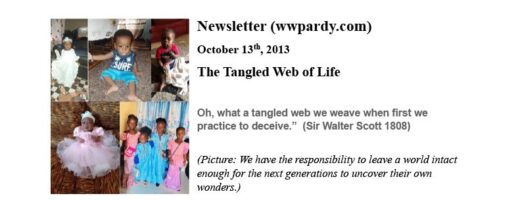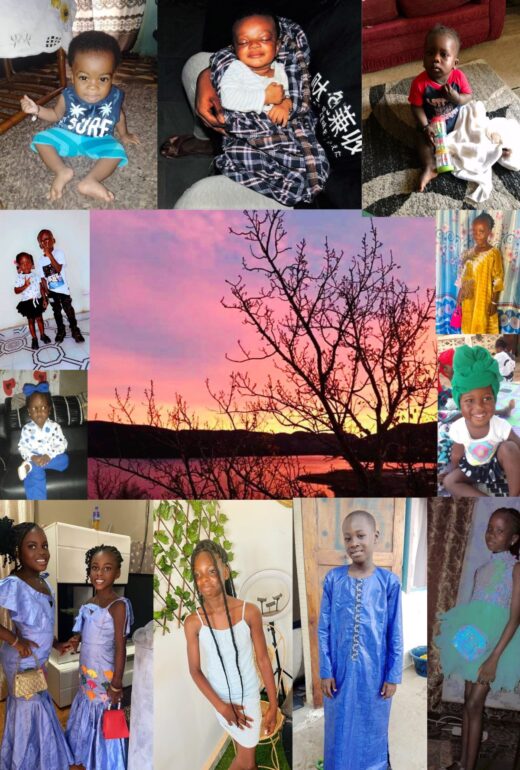Are there, in the flow of human experience, beginnings and endings? Or, is life similar to the ocean shoreline, the seasons or the universe? Do any of these have beginnings and endings or do people choose reference points to give them context and a corresponding illusionary sense of human control? Today, undeniably, there is an aversion to anything perceived as an `ending’ and a resistance to things that might be perceived as new `beginnings’. A perspective seems to be evolving which suggests that `change’ is not a ‘constant’ and further, that change must be avoided at any expense. There is fear of change, of lower living standards, of lifestyle disruptions.
An attitude has developed in parts of western industrial society, a feeling that a ‘destination’ has been reached and that it must be protected. Yet, in other jurisdictions, there is continued striving for accomplishment, achievement and attainment of chosen social or economic goals. Desperate efforts and struggles are being engaged in to arrive at some mythical development level as if there was really some optimum place – the justification being, apparently, that life is about accomplishment rather than ‘being.’
It has become obvious in present developed society that lifestyle, occupations and possessions have become more important than who people are and how they relate to others. The threat of others having as much or doing similar things, has created fears and resulted in divisions unlike any that the world has ever before experienced. These fears have been exacerbated by modern technology that allows instantaneous witness to atrocities and cruelties occurring even in remote parts of the world. Often such episodes are embellished and enhanced for the “viewing audience”. The result is that present perceptions of reality are skewed and twisted and cynicism and despair have developed. This has generated mistrust, fear and entrenchment. Such perceptions are evidenced in the statistics that get reported, the media coverage that is so anxiously pursued and panic-reactions to any sign of localized instability.
Traditionally, myths were societal attempts to give secure perspectives to life and living. These have, however, in present day institutions and cultural foundations lost their meaning. It appears that people have forgotten why they were created or what is their real intent. Over time these myths have become confused with reality. Dependence on myth appears to have been part of natural human evolution and only through plagues, economic depressions or created wars have people been brought back to life’s realities.
Technical and media tools are shattering the myths that have afforded most of our institutions their `control’. In fact, they are also exposing ‘control’ as its own myth. Examples can be sighted in Eastern Europe and many countries considered less developed than our own. The result in these areas has been a rapid destruction of the myths that have enslaved so many and caused such wanton destruction and human suffering. Because of the perceived “advanced” status of the more developed countries, pursuit of a mythical lifestyle continues unabated. The real failure is that the lifestyle (the protection of which, is the focal point of so much of our human struggle) is not now nor was it ever real. It is the figment of media and advertising campaigns and products of creative spindoctors who control much of our television and movie industry. The fears are therefore futile because what is being protected is something that is unachievable and certainly unsustainable, even for those with fiscal wealth.
The lack of sustainability of the lifestyle that has been sought is becoming most evident in the less developed areas of our society – the rural communities, the inner city neighbourhoods and economically crippled regions. These areas were the first to be affected because they are populated by the disadvantaged and the underdeveloped people in society. They are provided a measure of fiscal support and handouts – apparently to contain and quiet them – in the hope that somehow they would be satisfied with a little. But, like all humans of this generation they wanted more and better. The reality is that as they were provided with more the greater was the need to take from those that had accomplished more. The numbers of disadvantaged are growing and now include many of those who considered themselves secure and they are becoming more visible and more vocal. The gaps at the lower end are closing and those between the lower and the upper levels of society are widening. Study of history would suggest that this is a formula for upheaval and precursor of fundamental restructuring.
Current development approaches have become redundant. Development organizations have become bureaucratic and rigid. Standard theories have become outdated and obsolete. Yet, our fear of change and our unwillingness to recognize the reality of the present situation compel us to cling to outmoded myths without meaning or relevance.
Community development theory is but one example. Over the past fifty years the created myth suggests that, somehow, community is about place. Prolific current literature connects ‘community’ to “a sense of place”. As a result, development, in whatever form it is described, be it social, economic or even spiritual, has been focused on buildings, infrastructure, industry and possessions. Because people are enamoured with the idea that ‘having’ is fundamental and ‘being’ doesn’t count, little effort has gone into research or discussion that community is, finally, intimately connected to “a sense of being”.
A juncture has been reached whereby provision of all of peoples’ ‘wants’ is not fiscally affordable and their real ‘needs’ – for their personal contribution and affirmation – have been neglected. Thus, the real essence of community – that of a “sense of belonging” – has been forfeited.
Realization is dawning that development for its own sake has little purpose, is destructive and really doesn’t satisfy people’s needs or fill the voids that they are experiencing. This realization has resulted in disillusionment, despair and anguish. The fear of not knowing who they are, where they fit or the direction of society has become a compelling passion for most. This is compounded by the unwillingness of those in leadership roles and those that would be led to be honest with themselves or each other. It appears a sense of humility in the face of nature and the universe has given way to a belief that we do know and that we are in control.
The resolution will only come when a new starting point – is created. This can best be accomplished, as in other such periods of history, with an honest examination of our present circumstance and an analysis of our past leading to new understanding. It will require a thorough evaluation of data about ourselves, our situation and our real needs. This entails real introspection. Present approaches to introspection – called ‘consultation’ – most often leads to deflection, as people refuse to see what is obvious and real. This deflection then leads to the creation of new myths as an avoidance tactic to protect “our way of life”, as if even this aspect of our world, is not constantly in flux.
There are many demonstrative examples in the industrialized world, that can be sited, from the restructuring of the automobile industry through to the demise of resource sectors. One classic example in The Atlantic Region of Canada is the response to the collapse of the fishing industry. People are being supported, preached at, lectured to and trained but not involved in or provided with the frameworks or the honesty to deal with the challenges that they face. In fact, the support has provided them another myth that they are secure and will be supported. This has led many to invest, borrow and ultimately face more dire consequences when the support is no longer possible.
The reality is that the fishery and other natural resources collapsed as key employment entities not just now, but many years ago. Reliable and honest data and statistics would substantiate this. Instead of honest introspection there is still deflection and myths being perpetuated rather than new and innovative development being sought.
Introspection must lead to reflection because circumstance can only be understood when compared to those of other contemporaries and to past history. True reflection requires honesty and courage – especially the courage to share and the honesty to be truthful about current issues and real feelings. Discussing accomplishment or attainment is easy but to share real feelings is much more difficult. This requires humility. Present society has created the belief that humility is a sign of weakness and a demonstration of lack of intelligence. Yet, another myth – that to not be in control suggests frailty and ignorance.
Honest introspection and reflection eventually lead to new perspectives – perspectives that entail empathy and caring. It is only through caring that a true sense of community can be achieved. It is my contention that Community begins when two people share. The sharing is what creates the economy, and subsequently, lifestyle. Development is neither the beginning or the end; it is the process and the measure of the success of our ability to share. It relates to people, their aspirations, their dreams and, fundamentally, their own efforts to bring these to reality. Thus each sharing is a new beginning, new development and a new reality. Each sharing involves a process of introspection, reflection and perspective. It requires understanding, patience and trust – all arduous activities. Activities that are stressful and often encompassing pain – ultimately the real human avoidance issue.
The articulated desire of those in leadership, in industry and in development is for sustainable communities, sustainable industries and sustainable economies. What must be understood is that for these developments to be realized, sustainable people will have to be cultivated. Sustainable people are independent, confident and are comfortable with themselves. They are not overly preoccupied with their possessions, lifestyle or where they live. Real independence evolves from within and from beliefs and values that are shared with others.
An enormous challenge facing those of us who live in the ‘developed’ world – if it is to continue to thrive – is to commit ourselves to aiding a necessary and inevitable ‘attitudinal shift.’ And to do this effectively, we must begin the process of dispelling outmoded myths; recognize that community has little to do with place; accept that development is about people and realize that spiritual growth is more important than social support.
On an individual basis, some of this is already being done, but the process is impeded by our monolithic form of governance; by vested interests and those in positions of social and economic significance, who still continue to profit from the present theories, and by enormous ongoing investment in the present infrastructure.
The need for different and innovative approaches for people to communicate and share is crucial. The tools to facilitate such activities have never been more powerful. Unfortunately, the intransigence caused by this fear of the unknown is creating resistance to approaches that are non-traditional and different. As pressure on people becomes more severe, marginalization is increasing and frustration and intolerance growing.
Removing these mythical walls is the real issue in development. Creating bridges (frameworks) that move people to the next stage of caring and sharing is the real challenge. Bridges will need to encompass new technology and must be flexible and transparent. If they are not, they will become in themselves barriers and impediments – similar to technology itself, which is the present agent of fear, brought about through its misuse and the misrepresentation of its true potential and capabilities.
The first step that has to be taken in development must be the creation of these frameworks – the mechanisms that allow introspection and reflection. Safe spaces must be created which allow people to communicate openly without the fear of diminishment. The spiritual environments, that were once the domain of churches, will have to be regenerated to provide the environments that allows real communications and true reflection. Only through such mechanisms will the mirrors of reflection be converted into windows of perspectives to open historic walls of resistance.
The next development stage will have to be honest assessment of present circumstance based on accurate and credible data. Data that can be meaningfully compared with other sources and put in historic contexts. This data, when shared, will lead to explicit and useful information that can form the basis of shared knowledge. Knowledge always affords new perspectives which eventually leads to wisdom. The alternate is the present situation that leads people to wisdom through the pain of change. Wisdom, no less, but often causing frustration, resentment and disillusionment.
Wisdom will ultimately allow real empathy and caring that will lead to sharing and the beginnings of community – a new form of community that relates to the changed world in which we live. This community will not be constrained by physical boundaries but will provide both a sense of belonging and of sharing. It will allow people to transcend their fears and will again provide a sense of contribution and affirmation.
The sense of despair by those long resident in rural communities is not shared by the growing movement of others into these communities to escape the rush of city living. They bring new skills, different perspectives and the confidence to support themselves through the knowledge and wisdom that came from their experiences elsewhere. The transfer of their experiences is reviving traditional values, exposing outmoded myths and leading to new economies and enhanced social values. Proper frameworks for to expedite this sharing would rapidly change both the economies and the despair being experienced. They would lead to revitalized communities that are necessary for societal advancement and economic sustainability.


